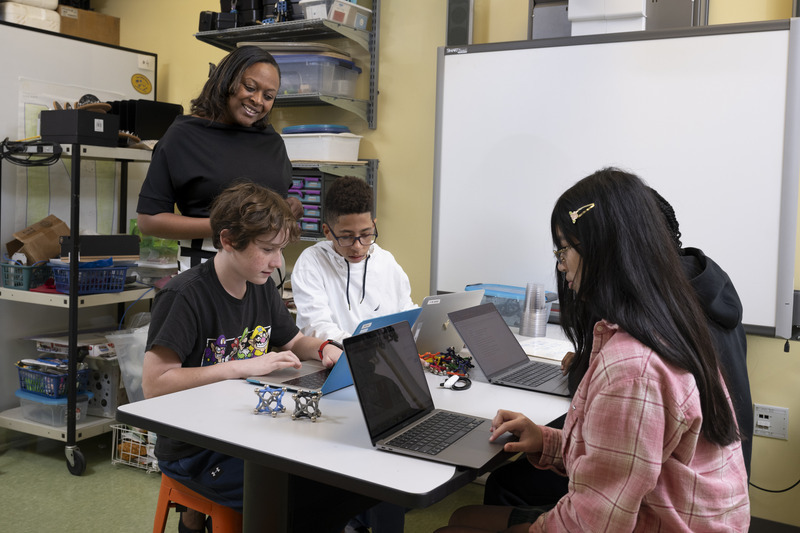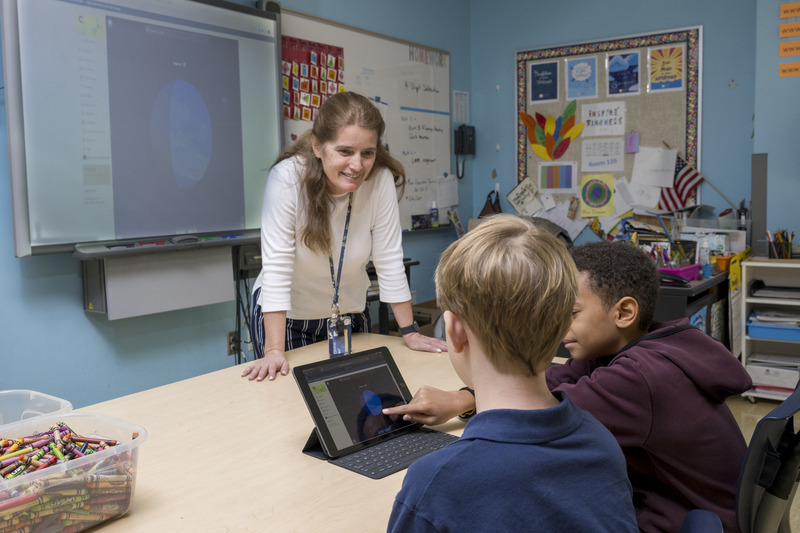The College School
Social Media Use and Academic Achievement

UD Associate Professor Mellissa Gordon finds that frequent social media use is associated with decreased academic achievement among early adolescents
While most people think about older teens and young adults as social media’s primary users, children as young as 11 are increasingly using these platforms on a daily basis. And as recent research from University of Delaware’s Mellissa S. Gordon shows, their social media use affects their school grades.
In an article published in Youth and Society, Gordon and co-author Christine McCauley Ohannessian analyzed survey data from 1,459 middle schoolers in the northeast United States and found that their academic achievement decreased as their Facebook, Instagram, Snapchat and Twitter (now known as X) use increased. They also found that parental communication made a big difference, playing a part in whether school grades increased or decreased.
“The landscape of social media is ever changing, and in spite of best efforts, it presents a challenge to keep pace with its effect,” said Gordon, an associate professor specializing in adolescent development in UD’s College of Education and Human Development. “Unfortunately, its impact on our most vulnerable population — children and adolescents — is not fully understood.”
Unlike most other studies, Gordon and Ohannessian’s study focused exclusively on early adolescents aged 11 to 15 years — the fastest growing population of social media users — and assessed four social media platforms, not only Facebook and Twitter. Because most research focuses on older adolescents or young adults, this study offers an important first step in understanding the links between social media use and academic achievement among early adolescents.

Social media use and academic achievement
Gordon and Ohannessian analyzed middle schoolers’ self-reported data on their school grades and social media use from surveys given in the fall of 2016 and the spring of 2017. Even after controlling for age, gender and race and ethnicity, they found that participants’ grades decreased as the frequency of their social media use increased across all four platforms.
“There are many explanations for this finding, which aligns with research on older population groups as well,” Gordon said. “For example, social media likely poses a distraction to early adolescents. Attention that they would typically invest in their schoolwork is diverted to social media use, which ultimately affects their ability to perform well in school. But lower academic achievement may also result from other aspects of development that are affected by social media use. For example, social media use can disrupt healthy family functioning or peer relationships, which can then lower early adolescents’ performance in school.”
The role of parental communication
Gordon and Ohannessian were also interested in how parental communication might impact the relationship between middle schoolers’ academic achievement and social media use. To investigate this question, they asked their study participants to define the quality of their communication with their mothers. For example, participants were asked to agree or disagree with a series of 20 statements, such as “My mother is always a good listener.”
Gordon and Ohannessian found that less frequent use of Facebook and Instagram, coupled with high-quality mother-adolescent communication, was associated with higher academic achievement.
“We think that mothers who were maintaining positive, frequent communication with their children might have also been monitoring their adolescents’ use of Facebook and Instagram, perhaps by setting daily limits,” Gordon said.
In contrast, low-quality mother-adolescent communication and increased use of Facebook and Instagram was associated with lower academic achievement.
Gordon and Ohannessian suggest that frequent social media use may allow an adolescent to establish more autonomy from their parents, which is a developmentally appropriate behavior for this age group. However, in doing so, communication with their mothers and the monitoring of social media may decrease.

Opportunities for parents
An important takeaway from Gordon and Ohannessian’s study is that parental involvement and communication can impact the relationship between frequent social media use and decreased academic achievement. Starting with small changes in a family’s daily practice — especially for parents who feel overwhelmed — can be very helpful.
“Setting parameters on children’s social media use, allowing access to certain platforms relative to others and monitoring the content that children engage with could help them maintain or even increase their academic performance,” Gordon said.
Andrea Glowatz, director of CEHD’s The College School and a mother to a 13-year-old middle schooler, offered other ideas, while acknowledging the challenges of parenting.
“Parenting is intellectually and emotionally draining, and while our logic and reasoning may tell us that our tweens and teens neither need nor benefit from social media, the forces of society often cause us to succumb to them,” Glowatz said. “Our tweens and teens are still vulnerable to predators, dopamine imbalances, distraction, addiction and other consequences that interfere with academic success. But teaching them about online safety and carefully monitoring their online use can offset some of these effects.”
The College School serves bright children with learning differences in grades 1 through 8. There, fifth graders have participated in a pilot cybersecurity program pioneered by UD researchers, and as part of their STEAM coursework with Master Teacher Laurie Drumm, children have lessons in online safety. In the coming months, Glowatz also plans to develop new programs on information literacy teaching children how to evaluate online news and other forms of media.
To learn more about CEHD research in adolescent development, visit our research pages.
Read this story on UDaily.
